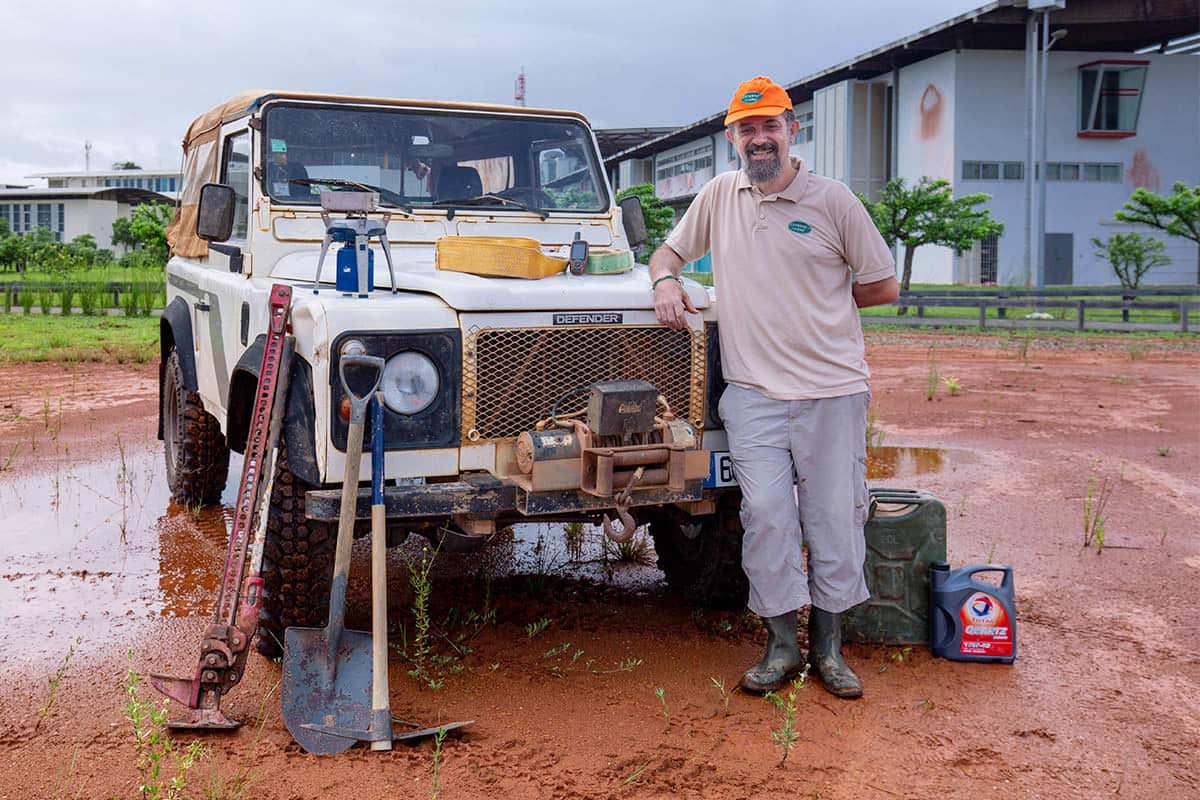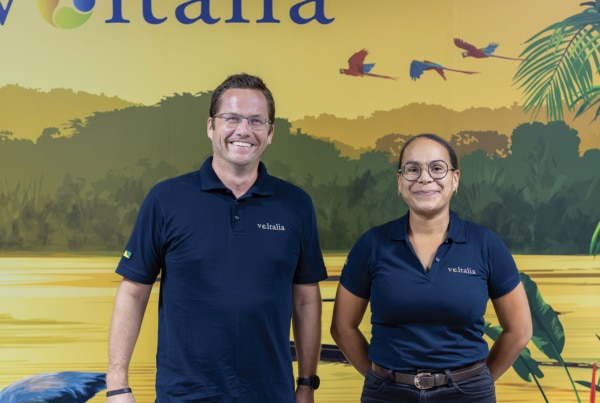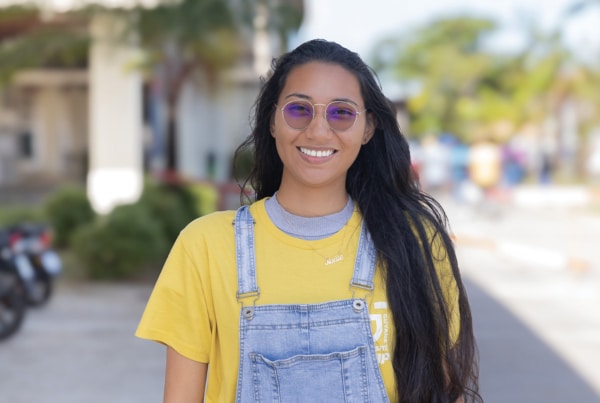
We meet Thierry, who is passionate about extraordinary rallies. He tells us how he discovered the world of rallies on the Guyana Plateau. A passion that requires more than just driving skills!
Tell us about yourself.
I'm assigned to the ÉSPÉ, where I'm in charge of IT. Essentially, the role of our department is to make available the digital devices needed for the smooth running of teaching and administration within the component, to propose new ones and to ensure the smooth running of those already in place. This work is shared with my colleague Marc Miatti. For my part, I administer the ÉSPÉ's Linux-based servers, including email, the web server, cloud storage and the network, both on the Cayenne campus and in Saint-Laurent, where we have a branch office. I'm also developing various applications to cover needs in terms of dashboards, automatic document production (attendance lists, for example) or more technical management. More transversally, I manage the technical aspects of the university's teaching platform, which is an evolution of the one that existed at the ÉSPÉ before the creation of the UG.
Why did you choose rally sport? When did you develop this passion?
When I arrived in French Guiana, I quickly realised that my trusty 205 couldn't take me everywhere: a number of tracks remained inaccessible to me. So I quickly opted for a Land Rover 4×4, renowned for its sturdiness and crossing capabilities. With our association Cayenne Land, we criss-cross the tracks of French Guiana, but also of Brazil and Suriname; we knew that a form of rally was regularly held there, but it was difficult to obtain information. In 2012, we got to know 2 crews from French Guiana who were taking part in the "Rallye des Savanes" and that's how it all started: with one of my friends from the Cayenne Land association, Jean-Noël CANOVA, we signed up, he as a driver and I as a navigator.
What were your first rallies like? Do you have any good memories?
It was a difficult start: our colleagues, who already had a bit of experience, explained to us how the events would work, but when we set off for the first time (it takes place at night, around 9pm) we were given instructions... in Dutch! Fortunately, it was a mistake that was corrected later that night (the rally always starts at night and the instructions are translated into English for internationals). At first, we tried to focus on the orienteering itself (each round comprises several stages based on standardised instructions) and we somehow managed to reach the finishing points, but not at all in time! That's the difficulty of the Rallye des Savanes: not only is it an orienteering race (you have to succeed in following the route laid out by the organisers), but you also have to be consistent, because you have to keep to the timetable as closely as possible. This is not a speed rally - going too fast loses you points, but so does going too slow... On the other hand, we spend most of our time on tracks, or even completely off-track when we're on the famous savannahs that give the rally its name.
How many rallies have you taken part in? Which was your favourite or the one that made the biggest impression on you?
We've already taken part in 7 editions of the Rallye des Savanes, plus an Eco Challenge, which is a 'light' version held at a different time of year. We compete in the 'international' category, which includes all non-Surinamese crews, mainly from French Guiana (there are now usually 6-7 Guyanese vehicles at the start), Trinidad, the Netherlands, and sometimes Brazil or other countries. Over the first 3 editions, we gained experience of how the events and the rally itself work, which enabled us to win in our (international) category in 2015, 2016 and 2017. Of course, there are plenty of good memories as we often find the same competitors (from Guyana or elsewhere) from one year to the next. The organisation of the rally is exceptional and we cross some magnificent sectors, so yes, there are some good memories. I particularly enjoy the sunrise after we've been driving all night after the start: generally, you have no idea where you are (you move from point to point) and the landscape gradually reveals itself to you. I'm also reminded of the evenings spent in the campsites in the forest, and the sometimes rude awakenings. In 2012, at 5am on a Sunday morning, the organisers set off firecrackers (a classic with our Surinamese friends) and brought a full brass band through the camp, playing at the top of their voices. Needless to say, there were no alarm clocks going off that day! The white sand savannahs are quite different from what you find in most of French Guiana (there's a bit of it around Sinnamary or Mana): the vegetation is sparse, you can see quite far, it's sandy, but the tests that generally take place there (orientation on aerial images) are our weak point, so the memory is mixed...
Is there a rally you'd like to do?
Of course! There are other events that would tempt me, but the Rallye des Savanes is a unique combination of orienteering and regularity that I don't know of anywhere else in the world. Not far from us, in Guyana, the Pakaraima Mountain Safari takes place every year. It seems to be more of a raid than a competition, but it would allow you to get to know this nearby country better. Further afield, in Poland and Germany, the Breslau takes place, a more technical crossing rally, but that's not in the same category...
Can you tell us about a typical rally?
The Rallye des Savanes is just one of the events in Suriname's rallying championship. It always takes place around All Saints' Day. The 1st vehicle departs from Paramaribo at around 8pm, followed by a vehicle every minute thereafter. There are usually between 60 and 90 vehicles taking part, all categories combined. Each vehicle has at least one driver and one navigator. But in the "tourist" category, it is possible to have passengers. The start is given on Friday evening, and the events take place throughout the night and Saturday until late afternoon. At this point, we take a rest in a place we don't usually know about in advance, usually in a hammock. On Sunday morning, we don't wake up too late, because the first group sets off at 7am... to find breakfast! Yes, there's usually a test to find the morning snack, and it's a question of not missing it... Then the tests follow one another until the evening. In the past, the rally ended on Monday evening (so there was an extra day) but because of the economic crisis in Suriname, it was cut by one day. The prize-giving ceremony is usually held on Tuesday or Wednesday, but by then we're already back in Cayenne, so we never get to attend!
What kind of preparation does such an adventure require?
Now we've got the hang of it, and we tend to set off without too much preparation... Where there's the most work to be done is in preparing the vehicle: of course it has to be as reliable as possible, the tyres have to be in good condition, and preferably the winch has to be working (you're never safe from taking a wrong step or pulling out another competitor). As far as specific equipment is concerned, the vehicle should be fitted with an odometer (a distance counter accurate to 10m for the model we have), a GPS and a tablet capable of connecting to the mobile network so that you can use various applications, in particular Google Maps satellite photos, which are very useful in certain circumstances (in the famous savannahs, for example).
What qualities do you think you need to enjoy this hobby?
First of all, it's a team sport, so it's best to know your team-mate well, to make things easier. To be a driver, you obviously need to have off-road driving skills, be able to negotiate off-road terrain or be familiar with 4×4 in general. Mechanical skills are welcome because, as in all sports of this kind, it's preferable to know your vehicle well and be able to diagnose and repair any problems: sometimes you get lost and can find yourself in difficulty in the middle of nowhere. For the navigation part, there are several categories of event, each requiring different skills:
- Tests where you have to follow a series of instructions require rigour and vigilance;
- Events where you have to work out the best route on a given map: assessing distances and knowing how to orientate yourself in space;
- Orienteering tests using aerial photos: good observation skills, ability to match pieces of images taken from different angles and to different scales;
- In all the events: ask yourself what trap the organisers have set for us!




